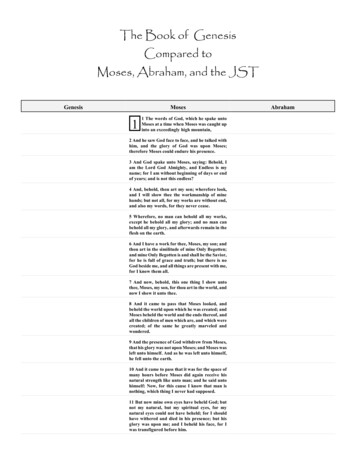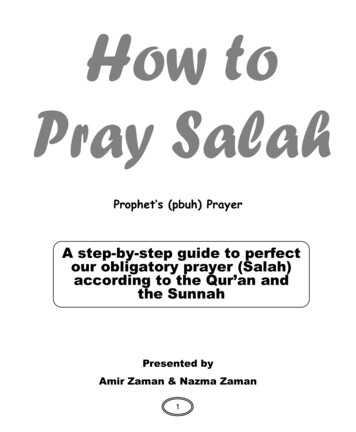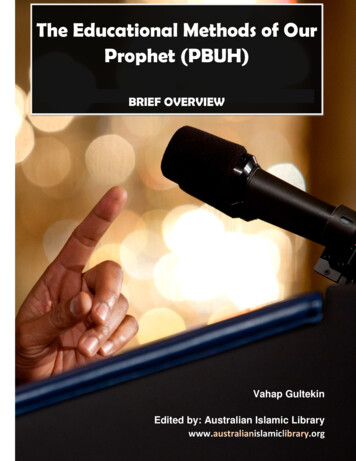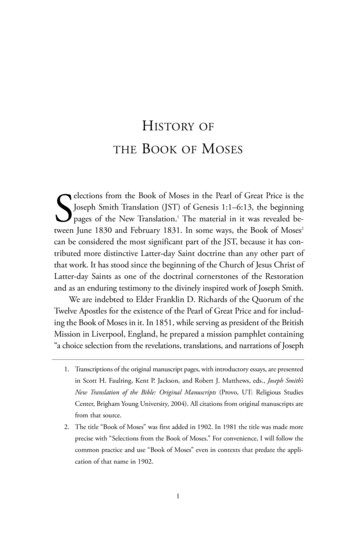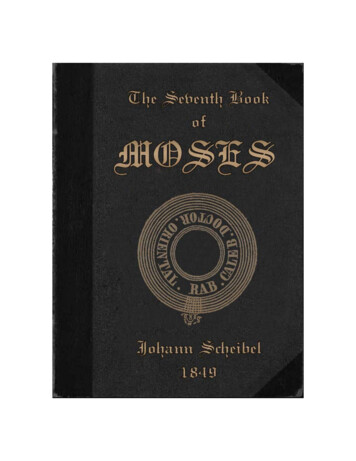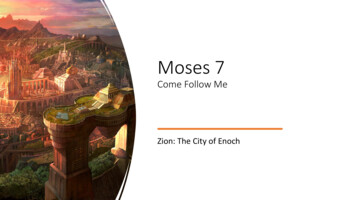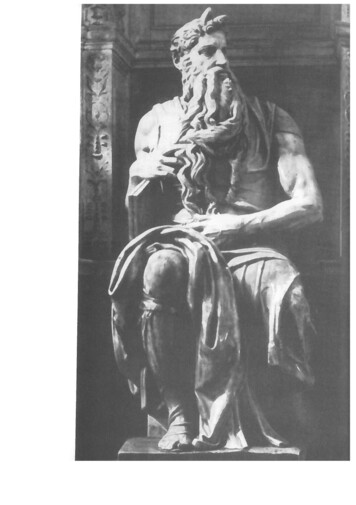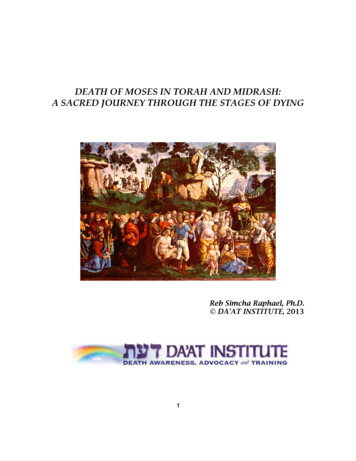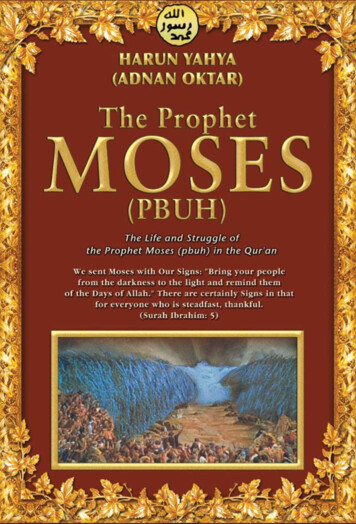
Transcription
Now writing under the pen-name of HARUN YAHYA,Adnan Oktar was born in Ankara in 1956. Having completedhis primary and secondary education in Ankara, he studiedfine arts at Istanbul's Mimar Sinan University and philosophy at Istanbul University. Since the 1980s, he has published many books on political, scientific, and faith-related issues. Harun Yahya is well-known as the author of importantworks disclosing the imposture of evolutionists, their invalidclaims, and the dark liaisons between Darwinism and such bloody ideologies as fascism and communism.Harun Yahya's works, translated into 63 different languages, constitute a collection for a total of more than 55,000 pages with 40,000illustrations.His pen-name is a composite of the names Harun (Aaron) andYahya (John), in memory of the two esteemed Prophets who foughtagainst their peoples' lack of faith. The Prophet's seal on his books'covers is symbolic and is linked to their contents. It represents theQur'an (the Final Scripture) and Prophet Muhammad (may Allahbless him), last of the prophets. Under the guidance of the Qur'anand the Sunnah (teachings of the Prophet [may Allah bless him]),the author makes it his purpose to disprove each fundamental tenetof irreligious ideologies and to have the "last word," so as tocompletely silence the objections raised against religion. He uses the seal of the final Prophet (may Allahbless him), who attained ultimate wisdom and moral perfection, as a sign of his intention to offer thelast word.All of Harun Yahya's works share one single goal: to convey the Qur'an's message, encouragereaders to consider basic faith-related issues suchas Allah's existence and unity and the Hereafter;and to expose irreligious systems' feeble foundations and perverted ideologies.
Harun Yahya enjoys a wide readership in many countries, from India to America,England to Indonesia, Poland to Bosnia, Spain to Brazil, Malaysia to Italy, France toBulgaria and Russia. Some of his books are available in English, French, German,Spanish, Italian, Portuguese, Urdu, Arabic, Albanian, Chinese, Swahili, Hausa, Dhivehi(spoken in Maldives), Russian, Serbo-Croat (Bosnian), Polish, Malay, Uygur Turkish,Indonesian, Bengali, Danish and Swedish.Greatly appreciated all around the world, these works have been instrumental inmany people recovering faith in Allah and gaining deeper insights into their faith. Hisbooks' wisdom and sincerity, together with a distinct style that's easy to understand, directly affect anyone who reads them. Those who seriously consider these books, can nolonger advocate atheism or any other perverted ideology or materialistic philosophy,since these books are characterized by rapid effectiveness, definite results, and irrefutability. Even if they continue to do so, it will be only a sentimental insistence, since these books refute such ideologies from their very foundations. All contemporary movements of denial are now ideologically defeated, thanks to the books written by HarunYahya.This is no doubt a result of the Qur'an's wisdom and lucidity. The author modestlyintends to serve as a means in humanity's search for Allah's right path. No material gain is sought in the publication of these works.Those who encourage others to read these books, to open their minds and hearts andguide them to become more devoted servants of Allah, render an invaluable service.Meanwhile, it would only be a waste of time and energy to propagate other booksthat create confusion in people's minds, lead them into ideological confusion, and thatclearly have no strong and precise effects in removing the doubts in people's hearts, asalso verified from previous experience. It is impossible for books devised to emphasizethe author's literary power rather than the noble goal of saving people from loss of faith, to have such a great effect. Those who doubt this can readily see that the sole aim ofHarun Yahya's books is to overcome disbelief and to disseminate the Qur'an's moral values. The success and impact of this service are manifested in the readers' conviction.One point should be kept in mind: The main reason for the continuing cruelty, conflict, and other ordeals endured by the vast majority of people is the ideological prevalence of disbelief. This can be ended only with the ideological defeat of disbelief and byconveying the wonders of creation and Qur'anic morality so that people can live by it.Considering the state of the world today, leading into a downward spiral of violence,corruption and conflict, clearly this service must be provided speedily and effectively,or it may be too late.In this effort, the books of Harun Yahya assume a leading role. By the will of Allah,these books will be a means through which people in the twenty-first century will attain the peace, justice, and happiness promised in the Qur'an.
TO THE READER A special chapter is assigned to the collapse of the theory of evolution becausethis theory constitutes the basis of all anti-spiritual philosophies. Since Darwinismrejects the fact of creation—and therefore, Allah's existence—over the last 150years it has caused many people to abandon their faith or fall into doubt. It istherefore an imperative service, a very important duty to show everyone that thistheory is a deception. Since some readers may find the opportunity to read onlyone of our books, we think it appropriate to devote a chapter to summarize thissubject. All the author's books explain faith-related issues in light of Qur'anic verses, andinvite readers to learn Allah's words and to live by them. All the subjects concerning Allah's verses are explained so as to leave no doubt or room for questionsin the reader's mind. The books' sincere, plain, and fluent style ensures that everyone of every age and from every social group can easily understand them. Thanksto their effective, lucid narrative, they can be read at one sitting. Even those whorigorously reject spirituality are influenced by the facts these books document andcannot refute the truthfulness of their contents. This and all the other books by the author can be read individually, or discussedin a group. Readers eager to profit from the books will find discussion very useful,letting them relate their reflections and experiences to one another. In addition, it will be a great service to Islam to contribute to the publication andreading of these books, written solely for the pleasure of Allah. The author's booksare all extremely convincing. For this reason, to communicate true religion to others, one of the most effective methods is encouraging them to read these books. We hope the reader will look through the reviews of his other books at the backof this book. His rich source material on faith-related issues is very useful, and apleasure to read. In these books, unlike some other books, you will not find the author's personalviews, explanations based on dubious sources, styles that are unobservant of therespect and reverence due to sacred subjects, nor hopeless, pessimistic argumentsthat create doubts in the mind and deviations in the heart.6
The Life and Struggle ofthe Prophet Moses (pbuh) in the Qur'anHARUN YAHYA(ADNAN OKTAR)7
ContentsIntroduction .11Sovereignty of Pharaoh in Egypt andthe Condition of the Children of Israel .13Birth of the Prophet Moses (pbuh) .19The Prophet Moses (pbuh) Departs from Egypt .24Enterance into the Country of Midianand His Settlement There .27Arrival at the Valley of Tuwa and the First Revelation .30Allah's Discourse with the Prophet Moses (pbuh) .31The Prophet Moses (pbuh) Requeststhe Prophet Aaron (pbuh) as a Companion .33The Story of the Prophet Moses (pbuh) andthe Mystery of Destiny.35Conveying the Message To Pharaoh andthe Proper Manner to Communicate It .39The Corrupted Reasoning of Pharaoh .41Signs to the End Times from the Story ofthe Prophet Moses (pbuh) .508
Titles of Egyptian Rulers in the Qur'an .61The Struggle of the Prophet Moses (pbuh)Against the Magicians .64The Prophet Moses (pbuh) Demolished the Idol of His Time .68Some of Pharaoh's Court Embrace Faith .70A Man of Faith in the Palace .74The Name 'Haman' in the Qur'an Is Also Mentionedin the Ancient Egyptian Inscriptions .80Depravity in Some of the PeopleAmong the Children of Israel .82The Period of Disasters and the Folly of Pharaoh .84Exodus From Egypt andthe Drowning of Pharaoh in the Sea .89The Arrogance of Karun and His Punishment .96Some Members of the Tribe of the Prophet Moses (pbuh) Strayand Worship the Golden Calf .102Perverse Conduct of Some of the PeopleAmong the Children of Israel .109The Prophet Moses (pbuh) and a Learned Man .114Conclusion .120The Evolution Deceit .1269
www.harunyahya.com - www.harunyahya.neten.harunyahya.tv10
Harun Yahya (Adnan Oktar)INTRODUCTIONThe history of mankind could be considered as a history ofthe prophets. Allah (God) has communicated His DivineRevelation to people by means of His messengers through-out history. These messengers told people about Allah and communicatedto them the words of our Lord.The struggle a number of prophets faced in spreading the message isdepicted in detail in the Qur'an. The hardships they faced, the solutionsthey brought by the leave of Allah and the exemplary behaviour are allclearly outlined. Allah communicates what His messengers endured as anexample for people, for their struggle and good character are also applicable for the people of today.In the Qur'an, the stories and experiences of various prophets, besidesthe Prophet Muhammad (May Allah bless him and grant him peace), suchas the Prophet Jesus, Solomon, Joseph, Noah, Abraham, and many others(peace be upon them all), are conveyed as examples. For instance, there arenumerous lessons for us in the righteous conduct of the Prophet Joseph(peace be upon him), as well as sagacious insight about human and socialpsychology in the Prophet Joseph's (pbuh) relation with his brothers, hisbeing thrown into a well by them, his being sold into slavery, his beingthrown into prison while a slave in the King's palace because of wrongfulaccusations, and his being placed in authority over the state treasury.There is indeed an important example for us in the Prophet Abraham(pbuh), who is mentioned by Allah in the Qur'an as " a great example11
THE PROPHET MOSES (PBUH)for you ," for his conscientiousness and clemency, and for putting histrust in Allah and his turning towards Allah when he was being cast into thefire.The prophet that is most frequently employed as an example in theQur'an is the Prophet Moses (pbuh). The Prophet Moses' (pbuh) name is referred to in 34 different suras (chapters). We can find extensive informationabout the life of the Prophet Moses (pbuh) in three of the largest suras (alA'raf, Ta-Ha, and al-Qasas). All these suras and verses offer detailed accounts of his difficulties with Pharaoh, beginning in his childhood, the evilconduct of some of his people and his struggle in communicating the message to them. His unyielding courage under the most stringent circumstances is presented with the intention of being an example to people.In this book we will examine the life of the Prophet Moses (pbuh) asit is depicted in the Qur'an. We will explore the events he has lived throughas it is described. Essentially, the events in the Prophet Moses' (pbuh) lifeshould not be regarded merely as events of the ancient past, but rather asevents and examples to shed light to our own lives today.12
Harun Yahya (Adnan Oktar)SOVEREIGNTY OF PHARAOH IN EGYPTandTHE CONDITION OF THE CHILDRENOF ISRAELBesides the city states established in Mesopotamia, Egyptiancivilization was one of the most ancient civilizations in history. Ancient Egypt is known to have had the most organ-ised social and political order of the time. Their invention of writing around3000 B.C., their use of the river Nile, the deserts surrounding the countryand serving as a strong defence against external threats were major factorsin the successful progression of the Egyptian Civilization.Nevertheless, this great civilization was ruled by Pharaoh, whose reignis clearly described in the Qur'an as an example of obstinacy. These peopleacted proudly against Allah, persisting in their denial of the religion.Therefore, even their advanced civilization, social and political order, andmilitary achievements, could not protect them from destruction.The most important events of the history of Egypt took place in connection to the presence of the children of Israel in the land.Israel is the other name of the Prophet Jacob (pbuh). The sons ofProphet Jacob (pbuh) had formed "the Children of Israel," the tribe whichin time came to be known as "Jews." The children of Israel first came toEgypt during the time of the Prophet Joseph (pbuh), the youngest son ofProphet Jacob (pbuh). In the Qur'an, a detailed account of the life ofProphet Joseph (pbuh) is given in Surah Yusuf. Beginning in the early yearsof his life, Prophet Joseph (pbuh) had faced many difficulties and had been13
THE PROPHET MOSES (PBUH)The children of Israel were enslaved by Pharaoh in Egypt and subjected to hardlabour.subjected to numerous assaults and slanders. Later in his life, after his release from prison by the decree of Allah where he had been put because ofa false accusation, Prophet Joseph (pbuh) was placed in authority over thetreasures of Egypt. His appointment was followed by the influx of the children of Israel into Egypt. Allah describes this in the Qur'an as follows:Then when they entered into Joseph's presence, he drew his parents close to him and said, "Enter Egypt safe and sound, if Allahwills." ( Surah Yusuf: 99)According to the account in the Qur'an, the children of Israel, who haddwelled in peace and security in Egypt, eventually lost their status in the society, and in time, were finally enslaved. From the related verses in theQur'an we understand that the children of Israel lived in such a condition atthe time the Prophet Moses (pbuh) arrived on the scene. As described in theQur'an, the Prophet Moses (pbuh) went to Pharaoh as "a member of an enslaved tribe." The following arrogant answer, which Pharaoh and his inner14
Harun Yahya (Adnan Oktar)circle made to the Prophet Moses (pbuh) and the Prophet Aaron (pbuh), informs us about this fact:They said, "What! Should we believe in two human beings like ourselves when their people are our slaves?" (Surat al-Muminun: 47)As depicted in these verses, the Egyptians had subjected the childrenof Israel to slavery and placed them in their personal service. To maintainand enforce this system of slavery, the Egyptians employed methods of repression. This pressure was exercised to the extent of controlling the entireIsraelite population. The proliferation of the male population, deemed to bea challenge to the Egyptian's own survival, was obstructed, whilst the female population was exploited for their service. Allah relates this fact in theverses:Remember when We rescued you from the people of Pharaoh. Theywere inflicting an evil punishment on you—slaughtering your sonsand letting your women live. In that there was a tremendous trialfor you from your Lord. (Surat al-Baqara: 49)Remember when We rescued you from Pharaoh's people who wereinflicting an evil punishment on you, killing your sons and letting15
THE PROPHET MOSES (PBUH)your women live. In that there was a tremendous trial from yourLord. (Surat al-A'raf: 141)The superstitious religion that was prevalent in the land of Egypt wasthe legacy of the idolatrous practices of Pharaoh's ancestors. (Surely Allahis beyond that) This unjust religion posited the existence of numerous gods.Pharaoh was, on the other hand, believed to be a supposed living god. Itwas precisely this belief which proffered pharaohs with such power overtheir subjects. Pharaoh and his immediate circle saw the Prophet Moses(pbuh) as a threat to the way of life dictated by the deviant religion of theirancestors, since, according to that religion, it was Pharaoh who possessedall the might and glory. Pharaoh's arrogance, his striving to maintain control, and his regarding the Prophet Moses (pbuh) and the Prophet Aaron(pbuh) as rivals, are evidenced in the following words of Pharaoh and hisimmediate circle, in their address to the Prophet Moses (pbuh) and theProphet Aaron (pbuh). Allah relates this in the Qur'an as follows:They said, "Have you come to us to turn us from what we found ourAn ancient Egyptian mural painting depicting the entry of the children of Israel intoEgypt.16
Harun Yahya (Adnan Oktar)fathers doing, and to gain greatness in the land? We do not believeyou." (Surah Yunus: 78)In accordance with his ancestors' perverted religion, Pharaoh claimedthat he was a so-called god. (Allah is beyond that). He even went to suchlengths as to claim he was their most exalted Lord. (Allah is beyond that).Allah informs us about this perverse attitude of Pharaoh in the below verse:(Pharaoh) saying, "I am your Lord Most High!" (Surat an-Nazi'at: 24)Because of their superstition, Pharaoh and his inner circle saw themselves as so-called divine beings. (Allah is beyond that). Their arrogancestemmed from the fact that they were far from the love, care and compassion, which are precepts commanded by the original religion. As a consequence of their arrogance, they believed themselves to have the right to resort to cruelty. Their mentality is conveyed in the following verse: to Pharaoh and his ruling circle. But they were proud and were ahaughty people. (Surat al-Muminun: 46)Pharaoh exercised such a great influence over the people of Egypt thatall submitted themselves completely to him. They believed Pharaoh was thesole possessor of the entire land of Egypt and the Nile river:Pharaoh called to his people, saying, "My people, does the kingdomof Egypt not belong to me? Do not all these rivers flow under mycontrol? Do you not then see?" (Surat az-Zukhruf: 51)The Nile was correctly said to be life for Egypt. All of Egypt dependedon the Nile for agriculture. She irrigated the crops, provided potable waterfor animals and people alike. According to Pharaoh and his inner circle, thesole owner of these waters and the land itself was Pharaoh. Everyone inEgypt acquiesced to his power and complied to his rule.In order to secure his power and reduce his people to submission,Pharaoh had divided them into factions and, by the help of his trusted advisors among them, ruled over these weakened groups. In a verse, Allahdraws our attention to this situation:Pharaoh exalted himself arrogantly in the land and divided its people into camps, oppressing one group of them by slaughtering17
THE PROPHET MOSES (PBUH)their sons and letting their women live. He was one of the corrupters. (Surat al-Qasas: 4)Prior to the birth of the Prophet Moses (pbuh), Egypt was a land of depravity and corruption. Based purely on racial discrimination, people wereenslaved and tortured. Without apparent justification, Pharaoh decreed thatall male sons born to his Israelite subjects should be killed. Moreover,plunged into arrogance and cruelty, he saw himself as a so-called god onearth. (Allah is beyond that) By way of an established system of rule,Pharaoh held everything under his control and made people adhere to him.It was under these circumstances that the Prophet Moses (pbuh) wassent by Allah as a messenger, to bring about an end to the oppression andcruelty, to remind people that He is our Lord, teach them the original religion, and rescue the children of Israel from captivity.An ancient Egyptian mural depicting the enslavement of the children of Israel inEgypt. In the foreground is Pharaoh and his inner circle, and in the background youcan see the slaves with ropes around their necks.18
Harun Yahya (Adnan Oktar)BIRTH OF THE PROPHET MOSES(PBUH)As related in the previous chapter, the Prophet Moses(pbuh) was born into adversity. Even at the moment of hisbirth, his life was already in jeopardy. Pharaoh ordered allmale children killed and the females spared for slavery. Ensnared by suchcircumstances, the Prophet Moses (pbuh) was forced to lead his life amongthe slaves under the constant threat of death. His mother had been concerned about him until the moment she was inspired by Allah:We revealed to Moses' mother, "Suckle him and then when you fearfor him cast him into the sea. Do not fear or grieve; We will returnhim to you and make him one of the Messengers." (Surat al-Qasas: 7)Allah inspired the Prophet Moses' (pbuh) mother and told her to puthim into a chest and send it floating down the Nile, if the soldiers ofPharaoh ever learned about his birth. As she feared for the life of her son,she followed what was revealed to her. Not knowing where and how theflowing waters would have carried her son, she placed the Prophet Moses(pbuh) into a chest and released him to the waters of the Nile. However, bythe inspiration of Allah, she knew he would ultimately return back to herand become a prophet. Allah, the Creator and Sustainer of everything, created the Prophet Moses (pbuh) and his mother and communicated what Hepreordianed for them. In the Qur'an it is related that some time later, Allahreminded the Prophet Moses (pbuh) about the facts of his early childhoodas follows:19
THE PROPHET MOSES (PBUH)When We revealed to your mother: "Place him into the chest andthrow it into the sea and the sea will wash it up on the shore, wherean enemy of Mine and his will pick it up." (Surah Ta-Ha: 38-39)At this point, we should expand on the subject of destiny. Allah, asspecified in the above verse, told the mother of the Prophet Moses (pbuh)to leave the child in the water, and informed her that Pharaoh would laterfind him, and that the Prophet Moses (pbuh) would ultimately return to heras a messenger of Allah. In other words, that the Prophet Moses (pbuh)would be placed in a chest and sent to the river, that he would be foundand taken care of by Pharaoh, and that he would eventually become one ofthe prophets, were all known beforehand. That is because all of theseevents were predetermined by Allah, according to His will, and which Heallowed the Prophet Moses' (pbuh) mother to know of in advance.Here, we should make note that all the details pertaining to the life ofthe Prophet Moses (pbuh) were predetermined in the Sight of Allah, andthat they had all come true as had been ordained. The fulfilment of the revelation offered to the Prophet Moses' (pbuh) mother was possible throughthe occurrence of countless conditions predetermined by destiny.The Prophet Moses' (pbuh) avoiding the soldiers of Pharaoh and hisreaching the palace of Pharaoh without drowning were dependent on thefulfilment of certain conditions. They are the following:1- The chest the baby Moses was placed in would have to have beenwatertight. Therefore, he who constructed the chest would have crafted itin appropriate manner so as to allow to float. Moreover, the shape of thechest was an important factor as far as its speed on the water; it had to neither flow too quickly, floating passed Pharaoh's palace, nor too slowly,stopping at some point before the Palace. The chest would have to havebeen crafted into just the exact shape so as to allow it to float at just the rightspeed. These factors all comprised the numerous details preordained aspart of the carpenter's destiny, crafting the chest exactly as he had to.2- The current that had carried the chest would have to have been neither too fast nor too slow, but just the right speed. This could have only20
Harun Yahya (Adnan Oktar)been possible by a precise calculation of the amount of rainfall which constituted the Nile's water volume-intensity per minute. This amount is alsopart of the intricate details in the destiny predetermined by Allah.3- The blowing winds must have also affected the chest in the appropriate manner. That is, the winds also blew in compliance with a certainpredetermined destiny. They must have blown neither too fast to cause it todrift, nor in the opposite direction, changing its direction, and nor too slow,slowing its speed.4- When in the Nile, no one could have found the chest. That is, noone, except who should have, was supposed to have come across it or noticed it. Consequently, in compliance with a specified destiny, every one living along the Nile had not been near to or noticed the chest. In fact, theseconditions were all part of the destiny preordained by Allah.5- As well as the life of the Prophet Moses (pbuh), the lives of Pharaohand his family, were also set to comply with a certain destiny. They wouldalso have to have been exactly at the right place at the right time so as topermit them find the Prophet Moses (pbuh). The family of Pharaoh couldhave planned to come to the shore earlier. The factor which had ordainedthem to come there at the precise time was their destiny.The above are only a few of the factors which allowed Pharaoh findthe Prophet Moses (pbuh). All of them had occurred exactly as was revealed to the Prophet Moses' (pbuh) mother. In fact, the promise Allah gaveto the mother of the Prophet Moses (pbuh), and all the other events whichhave happened, have all taken place and been fulfilled as already ordainedby Allah.The events involved in the Prophet Moses' (pbuh) destiny were notlimited to only those events recounted so far. Each moment of his life, as inthe case of lives of all human beings, is predetermined according to a specific destiny. Neither the place nor the year of his birth, nor the people hewas surrounded by, nor his mother or father were designated according tohis own choice. It was Allah Who ordained and created each one. This factwas also proclaimed by the Prophet Muhammad (May Allah bless him and21
THE PROPHET MOSES (PBUH)grant him peace) who said "Everything is by decree—even incapacity andability" (Muslim)A deeper consideration of these incidents will allow us to have a better grasp of how every moment of our lives is bound within our destiny.Through numerous examples, the Prophet Moses' (pbuh) story allows oneto contemplate the meaning and implications of his destiny. In the variousdetails of the story of the Prophet Moses (pbuh), Allah reminds us that anindividual's life, as well as the lives of all mankind and the whole universe,are bound within the destiny he has ordained.Just as how the Prophet Moses (pbuh) floated on the Nile in compliance with his destiny Allah preordained for him, so were Pharaoh and hisfamily made to reach the place where they were to encounter the ProphetMoses (pbuh). From the verses related to this subject, we learn thatPharaoh's family had behaved exactly as was previously revealed to theProphet Moses' (pbuh) mother, that is, they had taken the Prophet Moses(pbuh) under their care without being aware of what the future would holdfor them:The family of Pharaoh picked him up so that he might be an enemyand a source of grief to them. Certainly Pharaoh and Haman andtheir troops were in the wrong. The wife of Pharaoh said, "A sourceof delight for me and for you; do not kill him. It may well be that hewill be of use to us or perhaps we could adopt him as a son." Theywere not aware. (Surat al-Qasas: 8-9)And thus Pharaoh and his family, utterly unaware of what Allah preordained for them, found the Prophet Moses (pbuh) and adopted him as theirown son. In fact, they had decided to keep him in the hope that the childwould some day be of some benefit to them.In the meantime, the Prophet Moses' (pbuh) mother was concernedabout her son since she did not know what had happened to him. In theQur'an the state of the Prophet Moses' (pbuh) mother after putting him inthe chest and Allah's revelation to her is related as follows:"Go after him." And she kept an eye on him from afar and they werenot aware. We first made him refuse all wet-nurses, so she (Moses'22
Harun Yahya (Adnan Oktar)sister) said, "Shall I show you to a household who will feed him foryou and be good to him?"That is how We returned him to his mother so that she might delight her eyes and feel no grief and so that she would know thatAllah's promise is true. But most of them do not know this. (Suratal-Qasas: 10-13)The baby Moses refused all the wet nurses, that is, he did not drinktheir milk, because, according to the destiny outlined for him, Allah had ordained him to drink only his own mother's milk. This makes light of the factthat every moment of human beings' lives are also in compliance with thedestiny ordained by Allah. As had been revealed to his mother, the ProphetMoses (pbuh) ultimately returned to his own family.In the story of the Prophet Moses (pbuh), Allah illustrates that He often creates what appear to be difficult situation with an easy way out, andthat there is good in events which are perceived as adversities. A mother,fearing the threat of her baby being killed by cruel soldiers, to save him,leaves the child to float in the waters
Qur'an is the Prophet Moses (pbuh). The Prophet Moses' (pbuh) name is re-ferred to in 34 different suras (chapters). We can find extensive information about the life of the Prophet Moses (pbuh) in three of the largest suras (al-A'raf, Ta-Ha, and al-Qasas). All these suras and verses offer detailed ac-
